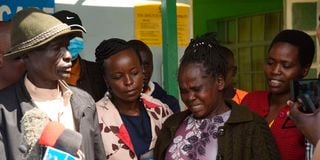Can rehabilitation stop the cycle of domestic violence?

Dead Ugandan athlete Rebecca Cheptegei's parents, Joseph Cheptegei (left) and Agnes Cheptegei (right) address a press conference alongside relatives at the Moi Teaching and Referral Hospital in Eldoret City, Uasin Gishu County, on September 5, 2024.
What you need to know:
- Are men like Dickson Ndiema simply unable to express themselves verbally, which is why they take it out on their significant others? Because I'm sure every man knows.
- They know that no relationship was built on coercion, violence, and retaliation. So, could such men know that they shouldn't be doing what they do to their partners when they come home drunk at night, but they just can’t stop?
Imagine how it would feel to have your partner hold a knife to your throat, and then try to stab you. Or when they wrestle you to the point of exhaustion before strangling you to death?
One wonders, if they could speak from the other world, how would our sisters, who have died at the hands of their romantic partners, describe their final moments?
These are the thoughts that ran through my mind yesterday when I received news of Rebecca Cheptegei’s death.
The 33-year-old Ugandan marathon runner, who was allegedly doused in petrol, and burned beyond recognition by her ex-boyfriend on Sunday night. I couldn’t help but think, “Again? So soon after Agnes Tirop? And Damaris Muthee? You’ve got to be kidding!”
Well, at some point in every relationship, courtship, or marriage, couples will have arguments about a wide range of issues – from financial matters to parenting decisions.
While no relationship is insulated from heated debates, the difference is that some partners fight fair or walk out on the relationship, while others resort to violence.
And as I write this, a question screams out for an answer that no one seems able to provide. What can be done to slay this monster called domestic violence? Heavy penalties and long jail terms haven’t worked so far.
And speaking of jail terms, the suspects involved in the murders of both Agnes and Damaris are walking free, having been released on bond.
Dickson Ndiema, Rebecca’s estranged partner, who is suspected to have killed her, is in hospital, but there is no way of telling that he will face the full force of justice even if he survives. That’s sad.
So let's focus on violent men for a moment. Could it be that they are simply unable to stop themselves? That they are just overpowered by their violent tendencies?
Are men like Dickson Ndiema simply unable to express themselves verbally, which is why they take it out on their significant others? Because I'm sure every man knows.
They know that no relationship was built on coercion, violence, and retaliation. So, could such men know that they shouldn't be doing what they do to their partners when they come home drunk at night, but they just can’t stop?
These men who lock their girlfriends in the house before beating them black and blue, could they be beating their breasts when all is quiet and saying to themselves, “This is getting out of hand, I need to get help?”
The same questions can and should be asked of women who abuse their partners. And as a solution, could it be time to perhaps open rehabilitation centres for people who admit they can’t stop physically abusing their partners?
Maybe that way we can stem this needless, senseless form of love that some men have decided is their best means of staying on top.
With deep pain and sorrow for the children of Rebecca, aged only nine and 11, I hereby ask, should we switch our focus from punishing perpetrators of gender-based violence, because punishing them is clearly bearing little fruit, and instead offer counselling to those who admit they can’t do without laying hands on their partners?
Will we save more athletes’ lives then?





